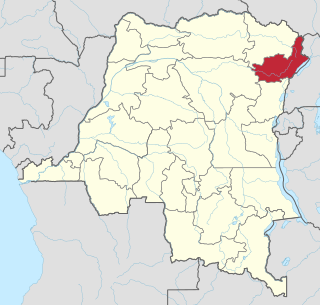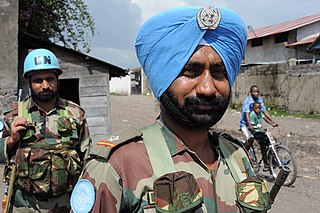Related Research Articles

The European Union Agency for Law Enforcement Cooperation, better known under the name Europol, formerly the European Police Office and Europol Drugs Unit, is the law enforcement agency of the European Union (EU) formed in 1998 to handle criminal intelligence and combat serious international organised crime and terrorism through cooperation between competent authorities of EU member states. The Agency has no executive powers, and its officials are not entitled to arrest suspects or act without prior approval from competent authorities in the member states. Seated in The Hague, it had 1,432 staff members in 2022.

The United Nations Organization Stabilization Mission in the Democratic Republic of the Congo or MONUSCO, an acronym based on its French name Mission de l'Organisation des Nations Unies pour la stabilisation en République démocratique du Congo, is a United Nations peacekeeping force in the Democratic Republic of the Congo (DRC) which was established by the United Nations Security Council in resolutions 1279 (1999) and 1291 (2000) to monitor the peace process of the Second Congo War, though much of its focus subsequently turned to the Ituri conflict, the Kivu conflict and the Dongo conflict. The mission was known as the United Nations Mission in the Democratic Republic of Congo or MONUC, an acronym of its French name Mission de l'Organisation des Nations Unies en République démocratique du Congo, until 2010.
An international decoration is a military award which is not bestowed by a particular country, but rather by an international organization such as the United Nations or NATO. Such awards are normally issued as service medals, for participation in various international military operations, and not for specific acts of heroism or bravery.

Operation Artemis, formally European Union Force Democratic Republic of the Congo (EUFOR), was a short-term European Union-led UN-authorised military mission to the Democratic Republic of the Congo during the Ituri conflict. ARTEMIS is considered the first military operation led by the EU, the first autonomous EU operation, the first rapid response mission of the EU, first operation outside Europe, first operation applying the principle of the framework nation and first example of "relay operation", conducted in cooperation between the EU and the United Nations. The deployment of EUFOR troops quickly decreased the conflict's intensity. It marked the first autonomous EU military mission outside Europe and an important milestone in development of the European Security and Defence Policy.

Europeans United for Democracy – Alliance for a Europe of Democracies, formerly known as EUDemocrats, was a Eurosceptic and self-described Eurorealist alliance of parties and movements from 15 European countries. It operated as a transnational party at the European level, according to Regulation (EC) No 2004/2003. It incorporated members from both the left and right of the political spectrum.

The European Union Co-ordinating Office for Palestinian Police Support, is a European Union Common Security and Defence Policy (CSDP) mission for the Palestinian territories, based and operational in the West Bank. It is part of the wider efforts of the European Union in support of Palestinian state building in the context of working towards a comprehensive peace based on a two-State solution. It is one of two civilian missions the EU runs in the Palestinian territories, the other being the European Union Border Assistance Mission Rafah.

The European Union Rule of Law Mission in Kosovo, known as EULEX Kosovo or simply as EULEX, is the largest civilian mission ever launched under the Common Security and Defence Policy (CSDP) of the European Union. EULEX supports selected Kosovo rule of law institutions on their path towards increased effectiveness, sustainability, multi-ethnicity and accountability, free from political interference and in full compliance with international human rights standards and best European practices through monitoring activities and limited executive functions with the aim of handing over remaining tasks to other long-term EU instruments and phasing out residual executive functions. The Mission's mandate covered the period until 14 June 2020 based on Council Decision CFSP 2018/856 and has been extended to 14 June 2021 by Council Decision CFSP 2020/792. EULEX works within the framework of UN Security Council Resolution 1244.
The UIC identification marking for tractive stock is a standard for identifying train stock like locomotives that supply tractive force primarily in Europe. Since the beginning of 2007 locomotives or other traction units in Europe have been given a 12-digit number. Vehicle numbering is now governed by the Intergovernmental Organisation for International Carriage by Rail and in Technical Specifications for Interoperability (TSI) of the European Union, specifically the European Railway Agency's CR OPE TSI. This makes the locomotive clearly identifiable within Europe and parts of Asia and northern Africa.
EUFOR Concordia was a European Union (EU) peacekeeping mission in the Republic of North Macedonia, which started on 31 March 2003. The EU took over from NATO's operation Allied Harmony and deployed around 300 troops to provide security to EU and Organization for Security and Co-operation in Europe (OSCE) monitors overseeing the implementation of the Ohrid Framework Agreement, a peace settlement resolving the conflict between the government and country's ethnic Albanian community. It thus became the first ever military operation of the EU. While keeping EU's control over the entire chain of command the mission closely cooperated with NATO through transparency and regular consultations and its headquarters were at the Supreme Headquarters Allied Powers Europe in Mons. France suggested fully autonomous EU operation but United Kingdom and Germany feared it will be perceived as antagonistic to NATO.

Turkish Cypriots and the European Union have somewhat strained relations because the European Union (EU) does not recognise the self-declared Turkish Republic of Northern Cyprus.

The area of freedom, security and justice (AFSJ) of the European Union (EU) is a policy domain concerning home affairs & migration, justice as well as fundamental rights, developed in order to tackle the challenges posed to internal security by collateral effects of the free movement of people and goods in the absence of border controls or customs inspection throughout the Schengen Area, as well as to safeguard adherence to the common European values through ensuring that the fundamental rights of people are respected across the EU.

United Nations Security Council Resolution 1925, adopted unanimously on May 28, 2010, after reaffirming previous resolutions on the situation in the Democratic Republic of the Congo, the Council extended the mandate of the United Nations Mission in the Democratic Republic of Congo (MONUC) until June 30, 2010, authorised a withdrawal of 2,000 troops and decided that from July 1, 2010, MONUC would be known as the United Nations Organization Stabilization Mission in the Democratic Republic of the Congo (MONUSCO) with a mandate until June 30, 2011.
The Democratic Republic of the Congo (DRC) is a source and destination country for men, women, and children subjected to trafficking in persons, specifically conditions of forced labor and forced prostitution. The majority of this trafficking is internal, and much of it is perpetrated by armed groups and government forces outside government control within the DRC's unstable eastern provinces.

The Common Security and Defence Policy Service Medal is an international military decoration awarded to individuals, both military and civilian, who have served with CSDP missions. Since the 1990s the European Union has taken a greater role in military missions both in Europe and abroad. These actions were taken under the Common Security and Defence Policy (CSDP), which is implemented by the European Union Military Staff, a department of the EU. To recognize service in these missions the EU authorized the creation of a medal with a common obverse and reverse, to which clasps featuring the missions' name are attached to the ribbon bar.
The European Union's Third Energy Package is a legislative package for an internal gas and electricity market in the European Union. Its purpose is to further open up the gas and electricity markets in the European Union. The package was proposed by the European Commission in September 2007, and adopted by the European Parliament and the Council of the European Union in July 2009. It entered into force on 3 September 2009.
United Nations Security Council Resolution 1756 was unanimously adopted on 15 May 2007.

Directive on intra-EU-transfers of defence-related products is a European Union Directive with relevance for the European Economic Area. "Transfer" in this context means "any transmission or movement of a defence-related product from a supplier to a recipient in another Member State".

EUPOL Afghanistan (2007–2016) was a European Union mission supporting the reform efforts of the Afghan government in building a civilian police service in Afghanistan.

European Union Advisory Mission Ukraine is a civilian Common Security & Defence Policy (CSDP) mission of the European Union. It aims to assist Ukrainian authorities to reform civilian security sector. It provides strategic advice and practical support to make Ukrainian civilian security sector more effective, efficient, transparent and enjoying public trust. EUAM Ukraine works with a number of law enforcement and rule of law institutions of Ukraine, and it formally began operation on 1 December 2014, following Ukrainian Government's request.
References
- 1 2 3 Council Joint Action 2007/405/CFSP at http://eur-lex.europa.eu/LexUriServ/LexUriServ.do?uri=CELEX:32007E0405:EN:NOT, 12 June 2007